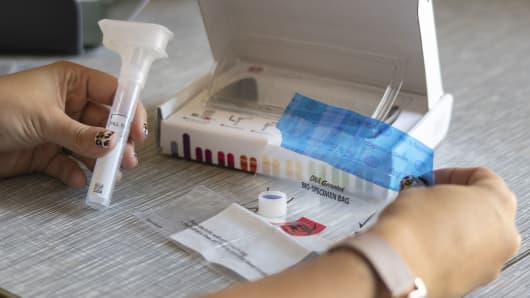Caveat Emptor!
"[I] knew at least cursorily, that false positives were common with these [genealogical] tests. [But] that didn't change the frightened feelings or concern, because I certainly couldn't blow it off."
"My wife and I were talking about having children. What do you do? Do you make that decision to pass this [genetic disposition] on to them?"
"I don't think that applies [his medical training leading him to find answers] to a lot of people."
Dr. Joshua Clayton, 29, radiology resident, Baylor University Medical Center, Texas
"People think they are getting the same kind of genetic testing as they would get from a certified clinical laboratory."
"Nothing could be further from the truth."
Stephany Tandy-Connor, genetic counselor, Ambry Genetics , medical testing certified lab
 |
Cayce Clifford | Bloomberg | Getty Images
A reporter examines a 23andMe DNA genetic testing kit in Oakland, California.
|
So, the story is that there are, as in most consumer-oriented services, those that have certification and follow strict rules imposed either by an industry-specific governing body or the government to ensure that the information they release to applicants falls within the permissible guidelines, and these specialized laboratories must, by law, ensure that the information they provide to those seeking their services, is accurate.
And then there are the uncertified laboratories offering their services to an uninformed, unwary public, services that the purveyors of such information as genealogy and medical data focusing on disease-causing genetic mutations whose findings can be inaccurate. They cover their tracks by appending a notice with the disclaimer that their data are "not intended for medical or health purposes", which can be very confusing to the recipient.
Joshua Clayton was one of those recipients. As a medical practitioner himself he nonetheless became involved with a non-certified laboratory in his search for personal genetic information. He began his innocent-enough odyssey when he sent a saliva sample to 23andMe, the well-known genetic testing company. Their report revealed nothing spectacularly new, when it was sent to Dr. Clayton. Who decided that he'd gone that far, might as well continue....
He turned around and forwarded the profile he had received, a product of 23andMe, to another company, Promethease, whose literature promised a more in-depth analysis specifically in search of any genetic disorders that could eventuate for those in possession of genetic mutations. Dr. Clayton ricocheted from a mundane initial report to a shocking follow-up, revealing a mutation linked to Lynch syndrome, a genetic disorder leading to the possibility of deadly cancers at an early age.
For two weeks, he sat on that report, mulling it over, fearful and depressed, and somewhat panicked. But then he asked around within the medical community for advice. The result of which was yet another genetic test, but this one conducted by a company with medical diagnostic expertise which informed him that his genetic makeup was entirely absent the mutation in question. He was, needless to say, much relieved.
But his experience mirrors that of many other people curious about their medical genetics. People lacking the resources available to those in the medical community. Many of whom -- after receiving their initial reports from legitimate, responsible companies like 23andMe and Ancestry.com whom law limits what they are able to reveal about a client's health status -- have no idea how to proceed. Raw data received often ends up with second companies for people opting for more in-depth analysis.
And they turn to companies lacking certification to provide medical diagnoses; companies that are the very opposite in their capabilities and approach to sophisticated academic centers. True, they take care as Promethease does, to alert their customers that their results are not to be regarded as medical diagnoses. They focus on comparing raw data given them by a client to gene variants known to be linked to disease. Their results can be uncertain, but consumers fail to understand this basic reality.
Genetic counselors, aware of the situation, feel concerned not only because people run the risk of receiving a response that falsely alerts them to claims they are susceptible through their genetic inheritance of falling prey to morbid disease at an early age, but the opposite occurring as well. That false-negative responses may lull them into a questionable sense of security; reassuring, but potentially dangerous.
These consumer companies seek to identify alterations in minute gene segments instead of examining the entire gene for changes; inexpensive, lacking comprehensiveness. The companies, however, because they are not making medical diagnoses, are not subject to quality controls imposed on certified laboratories required to produce confirmation that their results are accurate. The secondary, uncertified labs tend to place their reliance on databases which may be compromised, leading to incorrect analysis.
In their defence, when queried respecting the ethics involved, the companies simply repeat the disclaimer that the data are not meant to be used for medical or health purposes. This, despite the clear reality that they are quite aware that this is the very purpose their services are designed to provide and why it is that people wanting that information approach them to begin with. Validated diagnoses.
 |
You are made of cells. And the cells in your body have 23 pairs of chromosomes. Your
chromosomes are made of DNA, which can tell you a lot about you. Explore your 23 pairs
today.
Find out what your 23 pairs of chromosomes can tell you.
|

0 Comments:
Post a Comment
<< Home